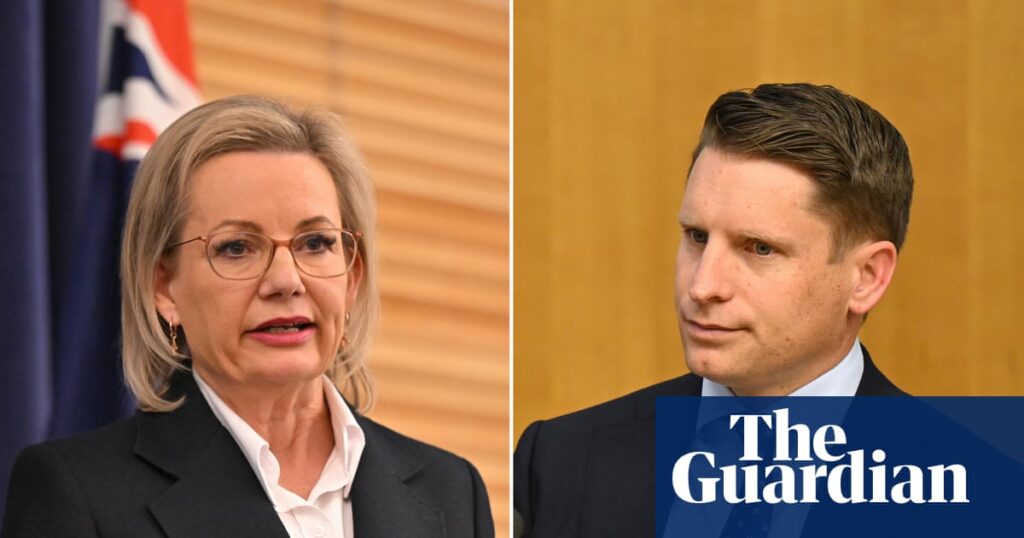Andrew Hastie has ruled out an imminent challenge to Sussan Ley’s leadership of the Liberal party after dramatically quitting the shadow cabinet.
But the former solider has vowed to keep publicly prosecuting his Australia-first agenda from the backbench, maintaining pressure on Ley as she attempts to unite her fractured party.
Hastie resigned from the frontbench on Friday over a split with Ley on immigration policy, following a series of provocative policy interventions that tested the opposition leader’s authority and raised speculation the former solider was preparing a tilt at the top job.
The West Australian MP claimed Ley made clear in a “charter letter” issued on Tuesday that the shadow home affairs minister would not be responsible for developing the party’s immigration platform, which he said made his position untenable given his outspoken stance on the issue.
Ley last week challenged Hastie’s suggestion that the rate of net overseas migration was making Australians “feel like strangers in our own home”, highlighting a split on the contentious policy.
“I was the senior lead for the portfolio, immigration is a core responsibility of home affairs, and so when it was made clear that I wouldn’t have any leadership in that role, I thought it was time for me to depart because essentially, I want to be able to speak about immigration, which I think is a critical issue for a lot of Australians at the moment,” Hastie told reporters in Perth on Saturday.
Sign up: AU Breaking News email
In a statement late on Friday, Ley said Hastie did not raise specific policy positions when he phoned her earlier that day to tender his resignation but confirmed he could not adhere to the principle of shadow cabinet solidarity, which requires frontbenchers to support agreed positions.
The Coalition does not have a formal immigration policy but it does believe the government’s permanent migration cap for 2025-2026 – set at 185,000 places, the same as the past financial year – is too high.
The shift to the backbench will give Hastie total freedom to prosecute his nationalist agenda on immigration, energy and domestic manufacturing, creating a contrast with Ley and heightening expectations of a future leadership bid.
Hastie had already threatened to quit the frontbench if the party recommitted to net zero by 2050.
The 43-year-old said he retainsed an ambition to one day lead the Liberal party, but he was not positioning himself to challenge Ley. The former Special Air Service soldier did not contest the post-election leadership ballot, citing the need to spend time with his wife and three young children.
“There’s no challenge to Sussan – I support Sussan,” Hastie said on Saturday. His decision to quit the shadow cabinet would give Ley “clear air” to develop an agenda to fight the next election due in 2028, he said.
The decision forces Ley into a second frontbench shuffle in four weeks after she sacked Jacinta Nampijinpa Price in the fallout from her comments on Indian migration.
Hastie’s personal crusades have split the Liberal party as it wrestles with its future direction after consecutive election defeats.
On Saturday, Hastie rebuked party elder Arthur Sinodinos after he criticised MPs for focusing on “culture wars” rather than “bread and butter issues”.
“I think his framing is out of touch,” Hastie said. “And I just don’t think he’s out there in the community – he’s not listening.”
Hastie said the Coalition could win the next federal election and rejected suggestions his agenda would not resonate in the former Liberal heartland seats now held by teal independents.
“I just don’t think the Australian people are ideological,” he said.
“And if we just write off the teals as being deeply ideological and opposed to the Liberal party, we’re never going to win them back. So every seat in this country is winnable. If you come up with a good platform, you build a big tent and and you develop a vision for this country.”
The Victorian Liberal senator James Paterson will temporarily return to the shadow home affairs portfolio after filling that role under Peter Dutton.
Paterson – a friend and factional ally of Hastie – said his colleague’s decision was “honourable” given he could not adhere to shadow cabinet solidarity.
He said while the public debate about the party’s future direction was understandable given the scale of the May election defeat, it “can’t go on forever”.
“If we’re still doing this in a year or two’s time, as we get to the back end of the term, I think that will be to our political detriment,” he said.

